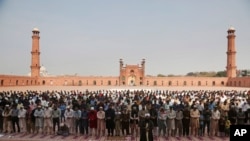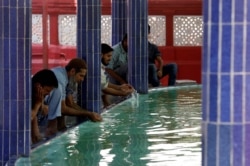Several of Pakistan's senior religious leaders announced Wednesday that they will keep mosques open for group prayers, on a day when the country's confirmed cases of COVID-19 crossed the 1,000 mark, and most of the country is under a lockdown.
The declaration seemed to counter an announcement from President Arif Alvi that upon his request, Egypt's Al-Azhar University's religious clerics' council issued a fatwa — an Islamic religious edict — that public gatherings, including group prayers in mosques, can be banned in the interest of public health.
The Cairo-based university is one of the oldest seats of Islamic learning, founded almost a century before Oxford University, the oldest university in the English-speaking world.
The Pakistani clerics said young children, old people, those who were sick or taking care of the sick could stay home. They also guided their followers to install sanitizers at the entrances of mosques, and advised more cleanliness.
However, they said the current pandemic demanded mass prayers.
"It is not possible to get rid of corona without asking God for forgiveness," said Mufti Taqi Usmani, one of the religious leaders.
Not all agreed with this interpretation.
"Please do not introduce a narrow-minded interpretation of our religion. Use common sense when interpreting religious texts," said Sen. Sajid Mir, a politician and a religious scholar.
The coronavirus outbreak has led to a debate in the Muslim world on how to respond. The Kingdom of Saudi Arabia, the epicenter of Islam, has canceled the Umrah pilgrimage for the time being.
Iran, home of Shi'ite Islam, which is dealing with a rising number of coronavirus-related deaths, has halted Friday prayers in major cities.





